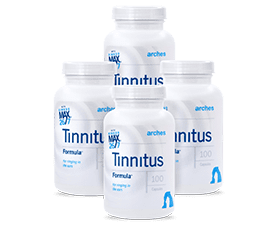By Barry Keate
Barry Keate, has lived with tinnitus over 40 years and has published 150+ research articles on numerous aspects of tinnitus. He is an expert on the condition and a well-known advocate for those with tinnitus.

(freepik/Freepik)
Basking in the warmth of the sunny summer months, it can be easy to take for granted how wonderful the sunshine is. Beyond giving the skin a warm glow, the sun is a key source of vitamin D. As autumn approaches and the days get shorter, getting the right amount of sunshine vitamin is crucial, especially if you experience tinnitus.
Vitamin D is essential for many bodily functions, from supporting immune health to regulating calcium absorption. And research is now revealing a link between vitamin D deficiency and the worsening of tinnitus symptoms.1
How Vitamin D Supports Auditory Health
Vitamin D is one of the utility players of micronutrients and does a lot more than just keep bones strong. It helps regulate inflammation, supports healthy nerve function, and is crucial in the maintenance of inner ear structures. When vitamin D levels are low, the body may struggle with processes vital to ear and nerve health, two areas that directly impact tinnitus.
The inner ear, which houses the cochlea and the vestibular system, is a delicate area of the body that is especially sensitive to nutrient imbalances. When vitamin D is lacking, it can lead to abnormal calcium regulation, affecting how the auditory nerves process sound. While a week or two of insufficient vitamin D intake won’t cause tinnitus, an ongoing imbalance can contribute to increased ringing or buzzing sensations.
Several studies have begun to highlight this connection. In one research group, individuals with chronic tinnitus had lower vitamin D levels than those without symptoms.2 While this doesn’t prove that a vitamin D deficiency causes tinnitus, it certainly suggests that addressing a deficiency could be a valuable part of a symptom management strategy.
Recognizing the Signs of Vitamin D Deficiency
Uncovering a vitamin D deficiency can be difficult if you aren’t looking for it, but some common symptoms may signal a nutrient imbalance. Feeling tired more often, experiencing frequent infections, or having unusual mood fluctuations, could be indicators of low vitamin D.
Many find the ringing in their ears becomes more prominent during the winter months when daylight hours are shorter. Likewise, eating an unbalanced diet for some time, can cause a worsening of symptoms soon after.
The best way to check for a deficiency is to get a simple blood test through your healthcare provider. Accurate test results can guide precision treatment, rather than guessing or self-medicating. It may lead to more rapid symptom relief sooner, with less trial-and-error.
Why Vitamin D Levels Are Important for Tinnitus
The cause of tinnitus can often be tricky to nail down, and is different for everyone. It can often develop after exposure to loud noise, ear injury or infection, or as a side effect of certain health conditions. But there’s also growing evidence that inflammation and immune responses play a significant role.
Vitamin D has strong anti-inflammatory properties. If levels are too low, your body may be in a constant state of low-grade inflammation. This can aggravate tinnitus symptoms and make it difficult to fight off potential ear infections. Being in this state can be risky for those who struggle with tinnitus.
Because noise can make tinnitus symptoms worse, you might be more likely to avoid noisy environments, stay indoors, or experience mental health challenges like anxiety and depression. These factors can lead to reduced sunlight exposure and declining vitamin D levels as well.
This creates a frustrating cycle. When tinnitus keeps you from going outside and less natural vitamin D exposure, symptoms become more difficult to manage. Breaking that cycle means being proactive about both your mental health and physical nutrition.
Improving Vitamin D Levels for Tinnitus Relief
Getting enough vitamin D isn’t complicated, but it does require a conscious effort, especially if you live in areas with limited sunlight for part of the year. One of the easiest ways to boost vitamin D levels is through regular exposure to sunlight. Aim for 10–30 minutes of midday sun a few times a week without any significant dietary or lifestyle changes. Plus, a bit of sunshine in the middle of the workday can be a great mood booster.
When regular sunlight isn’t possible, or simply isn’t enough, focusing on diet becomes incredibly important. Thankfully, many foods are high in vitamin D, and adding more of them to meals and snacks is an excellent way to reach your nutrient goals. Foods such as fatty fish, like salmon or sardines, fortified dairy products, eggs, and mushrooms can help increase your intake naturally.
You may also be able to reach your vitamin D goals by taking a daily vitamin. When finding what vitamin helps tinnitus, look for one that includes vitamin D. By pairing daily sunshine or a balanced diet with a tinnitus relief supplement, you can maximize your body’s ability to absorb and benefit from vitamin D.
Can Correcting a Vitamin D Deficiency Improve Tinnitus?
While vitamin D isn’t a cure for tinnitus, correcting a deficiency could help bring tinnitus relief and improve your overall experience with the condition. That doesn’t mean the ringing will go away completely. But it may become less intense or easier to ignore, especially when combined with other wellness strategies like sound therapy and stress reduction.
Think of vitamin D as one piece of a much larger puzzle. When it’s in place, the rest of your tinnitus management plan can function more effectively. Without it, you may be unknowingly fighting against your own body to find relief.
Practical Steps to Take Right Now
If you’re dealing with tinnitus and wondering whether vitamin D could be playing a role, here’s what you can do today:
- Schedule a vitamin D blood test to determine your current levels.
- Incorporate vitamin D-rich foods into your meals several times a week.
- Get safe, regular exposure to sunlight if possible.
- Talk to your doctor about high-quality supplements.
- Consider combining vitamin D with a tinnitus supplement that works.
Small Adjustments, Real Relief
Tinnitus can feel overwhelming, especially when you’re doing everything right but not seeing results. In those moments, it’s worth looking at smaller variables, such as vitamin D intake, that might quietly affect the body’s ability to heal and adjust.
Paying attention to the role nutrition plays in tinnitus symptoms can pave the way for more impactful changes. Whether it’s spending more time outdoors, making wise dietary choices, or adding a targeted supplement, these small steps can lead to noticeable improvements over time.
Remember, your journey with tinnitus is unique. But with knowledge, persistence, and the right tools, you can find relief—and maybe even some unexpected sources of support along the way.
Infographic
As autumn arrives and sunlight decreases, maintaining healthy vitamin D levels is crucial, especially for those with tinnitus. Vitamin D supports bone strength, immune health, and auditory wellness. This infographic highlights the connection between tinnitus and vitamin D deficiency.
1https://pmc.ncbi.nlm.nih.gov/articles/PMC10047354/
2https://pmc.ncbi.nlm.nih.gov/articles/PMC8372974/
Get Free Shipping!
Order now and get free shipping on either the Tinnitus Starter Kit or Combo Pack. Try the doctor recommended products with clinically proven ingredients for tinnitus. No coupon code required.


